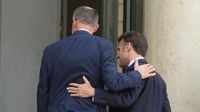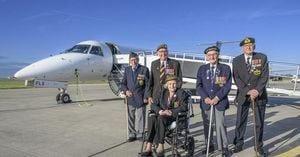Germany’s newly elected Chancellor Friedrich Merz has embarked on a significant diplomatic mission, visiting Paris and Warsaw to address pressing issues surrounding Europe’s security, migration policies, and the need for stronger transatlantic ties. Merz's first foreign trips as chancellor come in the wake of a tumultuous transition period, during which he faced an embarrassing false start to his tenure.
On May 7, 2025, Merz met with French President Emmanuel Macron in Paris, where he emphasized the necessity for all European Union members to increase defense spending. This call to action is aimed at closing capability gaps and collectively supporting Ukraine amid ongoing tensions with Russia. "Only in this way can we gradually close our capability gaps and collectively support Ukraine," Merz stated during a joint press conference with Macron.
Merz's commitment to a unified European defense framework was further underscored by Macron's announcement of a new Franco-German Defense and Security Council, which will regularly address shared strategic challenges. The establishment of this council signals a renewed commitment to cooperation between the two nations, which has been strained in recent years.
As the chancellor continued his whirlwind tour, he arrived in Warsaw where he was greeted by Polish Prime Minister Donald Tusk. The two leaders discussed the revitalization of the Weimar Triangle, a trilateral alliance between Germany, Poland, and France that has struggled to maintain relevance in recent years. Tusk characterized the meeting as a "new opening" in German-Polish relations, calling it "perhaps the most important in the history of German-Polish relations in more than 10 years." However, he cautioned Merz against unilateral migration policies that could leave migrants stranded in Poland. "There can be no impression that anyone, including Germany, would like to send any groups of migrants to Poland," Tusk warned.
Migration has emerged as a contentious issue between the two nations. Merz assured that Germany's tougher migration policies would be implemented in a way that would not negatively impact its neighbors. He articulated a vision for a Europe-wide approach to tackle irregular migration, stating, "If we give this signal especially to the traffickers, that these routes are going to get a lot more difficult and that we are going to close them, then that is a joint and good signal." Meanwhile, Tusk urged for a cooperative approach to managing migration at the EU's external borders rather than imposing national controls.
In a significant policy shift, Germany's new Interior Minister Alexander Dobrindt announced plans to turn some asylum-seekers away at the borders, marking a departure from previous practices. Exceptions will be made for vulnerable groups, including pregnant women and children. Dobrindt stated that the government would gradually increase border controls and police presence, aiming to curb irregular migration effectively.
As the discussions unfolded, Tusk reiterated the need for both countries to maintain the Schengen Zone's integrity, emphasizing that introducing border controls would be detrimental. "It would be the worst thing if all EU countries started introducing controls on their borders," he said.
The foreign ministers of several European countries expressed optimism about Merz's new government. British Foreign Secretary David Lammy noted, "We're looking forward to working together with the new German government," while Finnish Foreign Minister Elina Valtonen spoke of "high expectations" for effective cooperation. Czech Foreign Minister Jan Marian anticipated Germany would take a leading role in supporting Ukraine against Russian aggression.
Meanwhile, US Vice President JD Vance congratulated Merz on his election and expressed eagerness to discuss transatlantic relations. Merz indicated he would soon coordinate with US President Donald Trump on matters concerning Germany's policy towards the United States. "I know that we'll have a conversation with him in the next couple of days," Vance said.
On the broader geopolitical landscape, Merz asserted that the war in Ukraine cannot conclude without the involvement of the United States. He remarked, "We cannot end this war in Ukraine without a continued involvement of the United States of America; this is not something that Europeans can substitute for." His comments came as Russia announced a three-day ceasefire from May 8-10, raising questions about the sincerity of its commitment to peace.
Amid these discussions, Merz announced plans to visit Ukraine soon, aiming to strengthen ties and work towards a lasting ceasefire. This visit will signify Germany's commitment to supporting Ukraine in its ongoing conflict with Russia.
Merz's diplomatic endeavors are not just about addressing immediate concerns; they also reflect a broader strategy to restore Germany's leadership role within Europe. Wolfgang Ischinger, a former German ambassador to the US, emphasized the need for Germany to lead efforts toward a "core Europe" bloc, which would facilitate a more coherent foreign policy among select EU nations. Ischinger suggested that if Germany, France, and Poland could agree on majority decisions, it would enhance their collective strength in negotiations.
As Merz navigates these complex issues, the success of his administration will largely depend on his ability to balance domestic pressures with the expectations of international partners. The revival of the Weimar Triangle, effective migration policies, and a unified response to security challenges in Europe will be crucial in defining his chancellorship.
In conclusion, Friedrich Merz's initial foray into international diplomacy sets a tone for his leadership, emphasizing collaboration, security, and a proactive stance in addressing Europe's most pressing challenges. As Europe grapples with migration, defense spending, and geopolitical tensions, the efficacy of Merz's policies will be closely watched by allies and adversaries alike.




